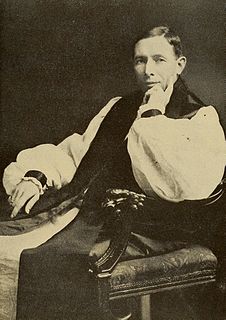A Quote by Gardiner Spring
Faith from, its essential nature implies the fallen state of man, while it recognizes the principles of the covenant of grace. It is itself the condition of that covenant. It is a grace which is alike distinguished from the love of angels and the faith of devils. It is peculiar to the returning sinner. None but a lost sinner needs it; none but a humbled sinner relishes it.
Related Quotes
Guilt simply says that you are a sinner. And the feeling of shame simply shows you that you need not be a sinner, that you are meant to be a saint. If you are a sinner it is only because of your unconsciousness; you are not a sinner because the society follows a certain morality and you are not following it.
Now the Father draws us from the evil of sin to the goodness of His grace with the might of His measureless power, and He needs all the resources of His strength in order to convert sinners, more than when He was about to make heaven and earth, which He made with His own power without help from any creature. But when He is about to convert a sinner, He always needs the sinner's help. "He converts thee not without thy help," as St. Augustine says.
In spite of our sinfulness, in spite of the darkness surrounding our souls, the Grace of the Holy Spirit, conferred by baptism in the name of the Father and the Son and the Holy Spirit, still shines in our hearts with the inextinguishable light of Christ ... and when the sinner turns to the way of repentance the light smooths away every trace of the sins committed, clothing the former sinner in the garments of incorruption, spun of the Grace of the Holy Spirit. It is this acquisition of the Holy Spirit about which I have been speaking.
Concluding a short series on sin: It is appalling to think of a power so strong that it can annihilate with the irresistible force of its grinding heel; but it is inspiring to consider an Almightiness that transforms the works of evil into the hand-maidens of righteousness and converts the sinner into the saint. And it is this latter power which eternal Love possesses and exhibits. He persistently dwells in the sinner until the sinner wakes up in His likeness and is satisfied with it.
The fatal effects of sin can be removed only by the provision that God has made. The Israelites saved their lives by looking upon the uplifted serpent. That look implied faith. They lived because they believed God's word, and trusted in the means provided for their recover. So to sinner may look to Christ, and live. He receives pardon through faith in the atoning sacrifice. Unlike the inert and lifeless symbol, Christ has power and virtue in Himself to heal the repenting sinner.
The cliché, God hates the sin but love the sinner, is false on the face of it and should be abandoned. Fourteen times in the first fifty Psalms alone, we are told that God hates the sinner, His wrath is on the liar, and so forth. In the Bible, the wrath of God rests both on the sin (Romans 1:18ff) and on the sinner (John 3:36).
In the new covenant, God doesn't want us to be blessed when we obey the law and cursed when we fail. Doesn't such a system sound awfully similar to the old covenant? Grace is the undeserved, unmerited and unearned favor of God - the moment you try to merit the free favors of God, His grace is nullified.



































